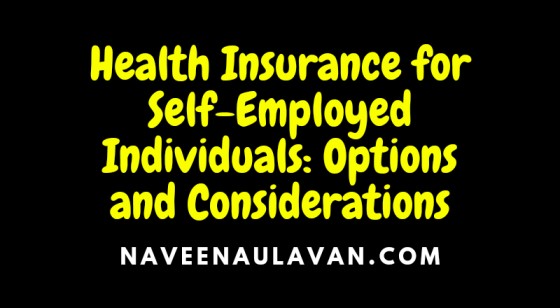Health insurance is a vital aspect of personal financial planning, and it becomes even more crucial for self-employed individuals. Unlike employees who typically have access to employer-sponsored health insurance plans, self-employed individuals must navigate the complex landscape of the health insurance market to secure adequate coverage. In this article, we will explore the various options available to self-employed individuals for health insurance and discuss important considerations to keep in mind while making this important decision.
Understanding the Importance of Health Insurance for Self-Employed Individuals
As a self-employed individual, you are responsible for your own healthcare costs, which can be significantly higher compared to those covered by employer-sponsored plans. Health insurance provides financial protection against unexpected medical expenses, ensuring that you have access to necessary medical care without facing exorbitant costs. Additionally, health insurance offers a range of benefits such as preventive care, prescription medications, and specialized treatments, which can help maintain your overall well-being and productivity.
Options for Health Insurance Coverage
Individual Health Insurance Plans
Individual health insurance plans are purchased directly by individuals and families from private insurance companies. These plans offer a range of coverage options, including different levels of deductibles, co-pays, and premiums. When considering individual health insurance, it is important to evaluate the extent of coverage offered, network of healthcare providers, and the cost-sharing structure. Comparing multiple plans and seeking guidance from insurance brokers or online marketplaces can help you find a plan that meets your specific needs and budget.
Health Insurance Marketplaces
Health insurance marketplaces, also known as exchanges, were established under the Affordable Care Act (ACA) to facilitate the purchase of health insurance plans. These marketplaces provide a platform where individuals can compare and enroll in different health insurance options. Depending on your income level, you may be eligible for subsidies or tax credits to help reduce the cost of premiums. Marketplaces offer a variety of plans from different insurance providers, allowing you to choose a plan that aligns with your preferences.
Health Savings Accounts (HSAs)
Health Savings Accounts (HSAs) are tax-advantaged accounts that allow individuals to save money for medical expenses. To be eligible for an HSA, you must have a high-deductible health insurance plan (HDHP). HSAs offer several advantages for self-employed individuals, including the ability to contribute pre-tax dollars, potential tax-free growth of funds, and the flexibility to use the funds for qualified medical expenses. By combining an HDHP with an HSA, you can lower your premium costs while still having funds set aside for healthcare expenses.
Factors to Consider when Choosing Health Insurance
Cost
When evaluating health insurance options, cost is often a primary consideration for self-employed individuals. You need to assess both the monthly premiums and out-of-pocket expenses, such as deductibles, co-pays, and coinsurance. It’s important to strike a balance between affordability and the level of coverage provided. Carefully analyze your budget and anticipated healthcare needs to determine how much you can comfortably allocate towards health insurance premiums.
Coverage
Consider the coverage provided by each health insurance plan, including the services and treatments included, prescription drug coverage, and access to preferred healthcare providers. Review the plan’s network of doctors, hospitals, and specialists to ensure that you have access to the healthcare providers you trust. Additionally, check whether the plan covers essential health benefits mandated by the ACA, such as preventive care, mental health services, and maternity care.
Flexibility
Flexibility is crucial for self-employed individuals who may experience fluctuations in income or changes in their healthcare needs. Look for insurance plans that offer a degree of flexibility in terms of adding or removing dependents, changing coverage levels, and adjusting deductibles. This flexibility allows you to adapt your coverage as your circumstances evolve.
Health Savings Options
If you opt for a high-deductible health insurance plan, consider the availability of Health Savings Accounts (HSAs) or Flexible Spending Accounts (FSAs). These accounts offer tax advantages and provide a means to set aside funds specifically for healthcare expenses. Evaluate the contribution limits, investment options, and withdrawal rules associated with these accounts to determine which one aligns with your financial goals.
Customer Service and Support
Adequate customer service and support are crucial when dealing with health insurance providers. Research the reputation and track record of insurance companies in terms of claim processing, customer satisfaction, and responsiveness to inquiries. Look for reviews and ratings from existing policyholders to gain insights into the quality of service provided. A supportive and responsive insurer can greatly ease the process of managing your health insurance coverage.
Additional Considerations
Network Accessibility
If you have preferred doctors, specialists, or healthcare facilities, ensure that they are part of the network associated with your chosen health insurance plan. Out-of-network care can be significantly more expensive or may not be covered at all, so it’s important to verify network accessibility before making a decision.
Pre-existing Conditions
If you have pre-existing conditions, ensure that the health insurance plan you select covers the necessary treatments and medications. While the ACA prohibits insurers from denying coverage or charging higher premiums based on pre-existing conditions, it’s essential to review the specific details of each plan to understand how they address pre-existing conditions.
Future Planning
Consider your long-term healthcare needs and how they may evolve over time. If you anticipate major life changes, such as starting a family or transitioning into retirement, evaluate how well the chosen health insurance option can accommodate these changes. Being proactive and planning ahead can save you from having to switch plans or face coverage gaps in the future.
Conclusion
Health insurance is a critical component of financial planning for self-employed individuals. By exploring the various options available, carefully evaluating costs, coverage, and flexibility, and considering personal healthcare needs and preferences, self-employed individuals can make informed decisions to secure the right health insurance coverage. Remember to consult with insurance brokers, seek advice from professionals, and thoroughly review policy terms and conditions to ensure the best possible coverage for your unique circumstances.
